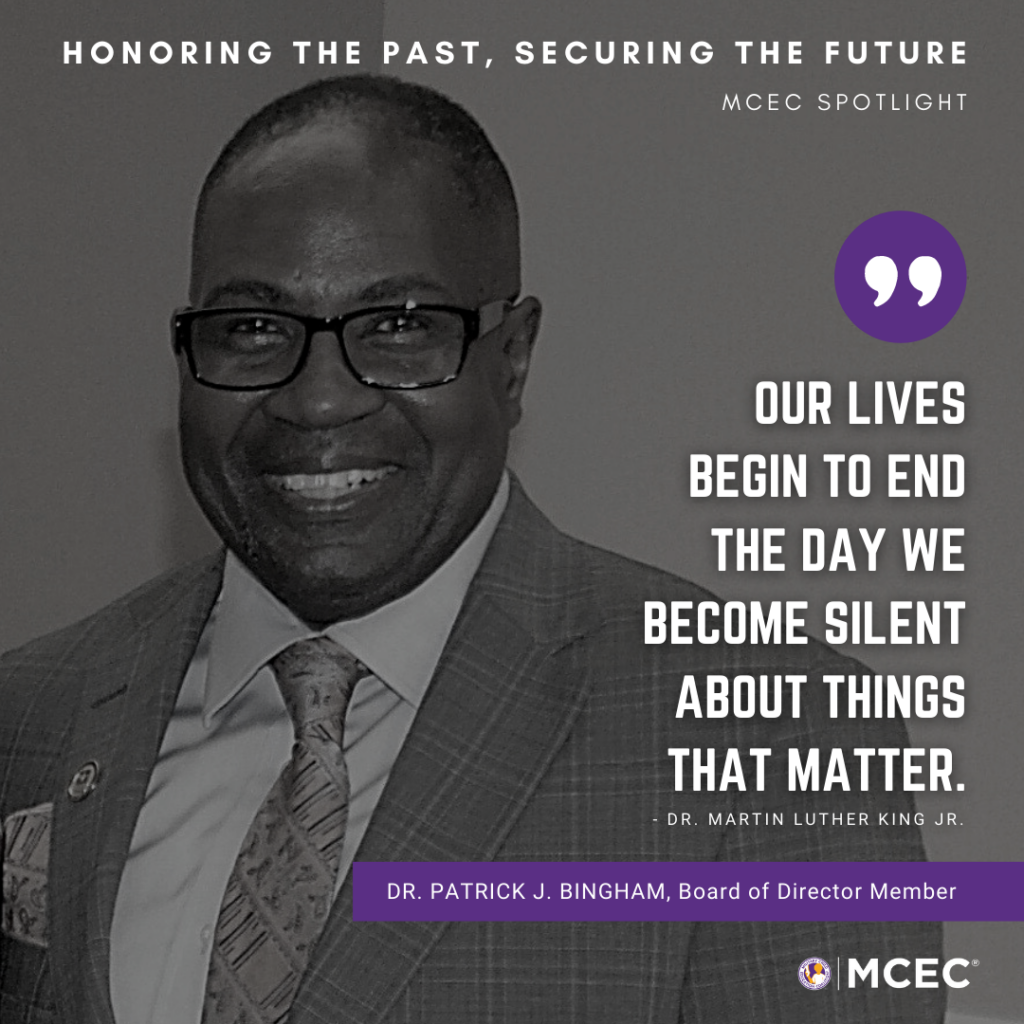Embrace Who You Are, and Share Those Blessings with Others
It seems like we all have those go-to words that astute listeners like to say are our “crutch words.”
After speaking with Dr. Patrick Bingham for less than five minutes, there was no doubt that he, too, had a favorite word. But Bingham’s word is not a crutch. It’s an exclamation. A charge he has pledged to keep and a rallying cry for people to understand where he stands on the battlefield of life.
That word? Education.
“Education is the great equalizer,” said Bingham.
Bingham who goes by “P.J.” to his closest friends and family, was born at the original Walter Reed Army Medical Center, the son of a U.S. Army staff sergeant who served as a cook. “My dad didn’t get a chance to go to college, and joining the Army offered a better way of life,” said Bingham.
Bingham noted that his mother and father shared stories with him about schools letting students out in the fall so the African American kids could work the fields. “[My father] believed that the value of an education is something you can’t take away from someone,” added Bingham.
His parents always stressed the importance of getting good grades and a good education to Bingham, his sister, and his brother. He recalls his parents reminding him that the quickest way to get in trouble was getting a less than positive note from teachers.
Growing up in the 1960s, Bingham said he didn’t have a lot of exposure to Black history outside of his home. “When you’re African American, it’s part of who you are,” added Bingham. “But it wasn’t something that was taught or discussed in school.”
The fact Black history was not part of education had little to do with efforts to promote its importance.
Carter G. Woodson, known today as the “Father of Black history,” founded the Association for the Study of Negro Life and History in 1915 and championed Negro History Week, the precursor to today’s Black History Month, in 1926. The NAACP references his work and lifelong commitment on their official website, “[Woodson’s] message was that Blacks should be proud of their heritage and that other Americans should also understand it.”
It would take another 50 years until President Gerald Ford officially proclaimed February as Black History Month.
When his father was assigned to a unit in Germany, he and his mother moved to South Carolina to be closer to family. It was during this time Bingham experienced the division that America was going through.
During the mid-1960s, Bingham’s father was placed on assignment to Germany. At the time, there was no availability for the soldier to bring his family. Since Bingham’s father had to move, the family was no longer able to live on post, and they decided to move to South Carolina close to family.
This move served as an eye-opener for the Bingham who remembered this move and the events that followed as the nexus for his view on the importance of education.
Bingham learned very quickly that the life and educational opportunities he had been exposed to at the Department of Defense Dependents School at Fort Belvoir, Va., was not the same in his new town in South Carolina where segregation was still practiced.
Bingham said he remembered coming home the first day and telling his mother, “there were only colored kids in my class today.” His grandmother overheard Bingham talking to his mother and replied, “Baby, that’s how it is down here.”
He noted that prior to their move, he had not been exposed to segregated environments where he and others would be separated due to the color of their skin.
Bingham also reflected on the fact that shortly thereafter he got in trouble with his mom because he made the comment that the kids in his class couldn’t read. As a DoDDS kid, Bingham had been in an environment where education for one was education for all. That, however, was not the case in the south.

“I got a swat on the hand because I was laughing, and my mother told me that I should never laugh at someone who was struggling,” continued Bingham. “That stuck with me. I understand that fair and equal are two different things, and when there is such a large disparity in resources, it makes learning tougher. This is why allowing children to have a quality education is so important.”
After high school, he followed in his father’s footsteps and joined the U.S. Army Bingham commissioned as an air defense artillery officer in 1981 and deployed to Israel during Desert Strom. After 10 years of service, Bingham said he realized he had another calling.
After talking with his family and being reminded about his passion for education, Bingham chose to resign his commission and transition into academia.
“I always believe that education opened up doors to a better way of life, and I never looked back,” said Bingham.
During his first years as an educator, Bingham taught second and fifth grade.
“At the time, there were not a lot of black men in education at the elementary level, but I prided myself on being a person who was confident and caring,” said Bingham. “Students and parents saw that, people learned that a role model can be successful regardless of the color of their skin.”
Bingham would advance throughout the education system and serve as an assistant principal and principal before retiring as an assistant superintendent.
“You see the value of education,” added Bingham. “I believe that all parents want is a quality education for their child. I worked hard every day to make that desire a reality for them and their students.”
While Bingham was making progress in the classroom, his wife, was blazing new trails and breaking barriers in the Army. Lt. Gen.Gwen Bingham, retired, served for more than 30 years. She became the first female garrison commander at Fort Lee, Va. and the first African American female in the Quartermaster Corps to earn the rank of Brig. Gen.
“Black History Month acknowledges all these wonderful achievements, and it’s so important,” continued Bingham. “It ensures relevance and the contributions of so many are recognized.”
Bingham offered that this month puts a focus on the past and where we are in the present. Although he does not believe we, as a society, are “there yet,” he does feel that discussions continue to move us toward the goal of universal understanding, respect, and equality.
“Entitlement is not something Blacks get,” added Bingham. “When we walk into a room, we get judged on the color of our skin. People historically judge us and others on what they think we are.”
However, despite the looks or the perceptions of others, Bingham leads his life with one thought: “Embrace who you are, and share those blessings with others.”
That message is echoed in his actions and interactions with others.
Bingham continues to serve on the MCEC® Board of Directors and advocate for quality education for all military kids. What would you expect from a former military officer, spouse of a retired general officer, parent to a military-connected child, and life-long educator?
“There is value in what MCEC does, and as long as I’m around, I’ll continue to advocate for military children,” said Bingham. “I was one of them. I had two of my own, and I saw the trials and tribulations they faced. It’s important. Our children need a voice, and that voice is MCEC.”
Read other stories celebrating Black History Month:

Friendships and Family Enrich the Lives of the Ones We Touch and Make All the Difference
Part II of a three-part series highlighting the resiliency, commitment, and impact of African American Veterans and Families.